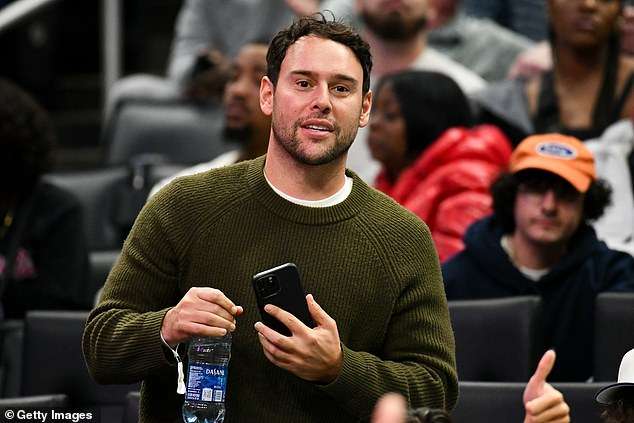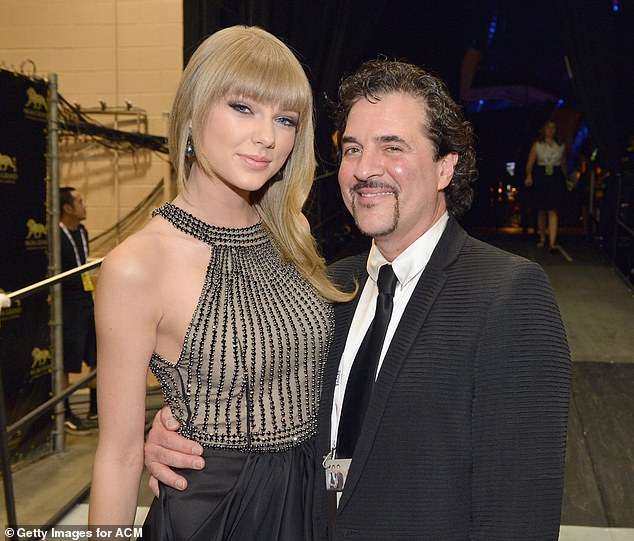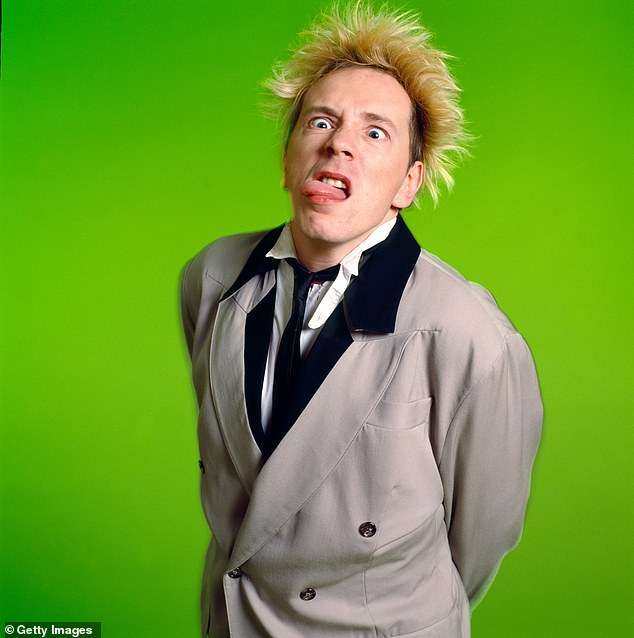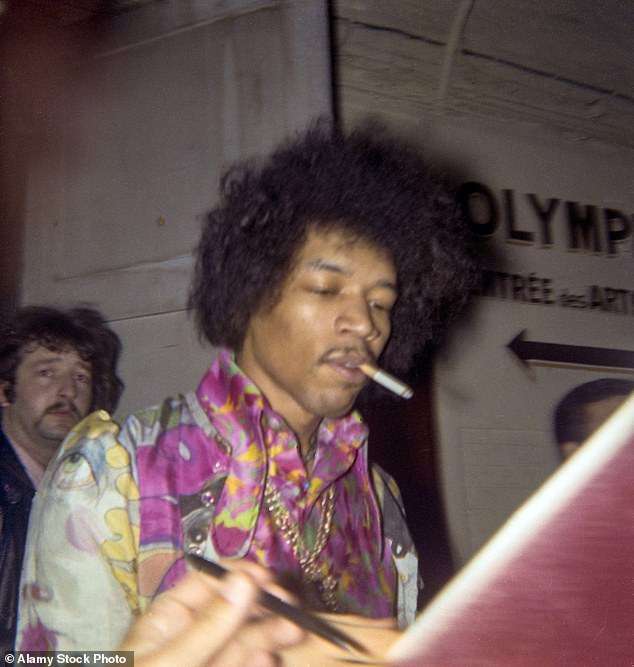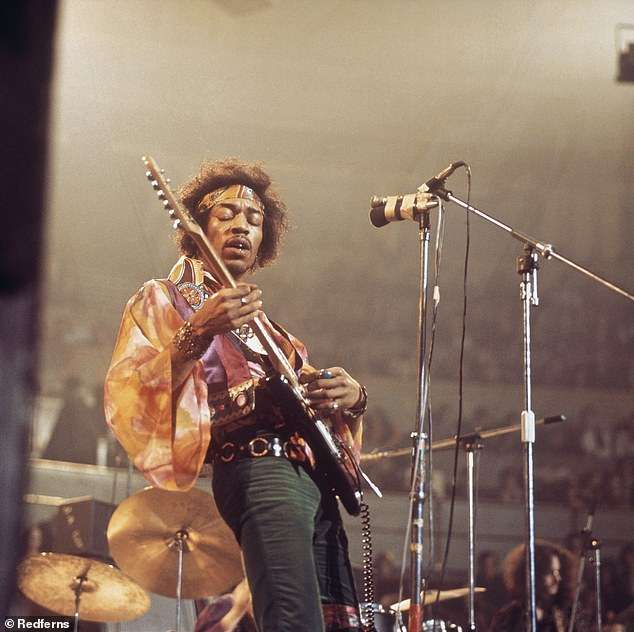The relationship between ‘the talent’ and music managers in Rock ‘n’ Roll history is often a fraught one – filled with feuds, millions lost in court spats, and even murder allegations.
From Jimi Hendrix, whose manager allegedly confessed to killing him, to Taylor Swift’s bitter row over her first six albums, the list of musicians warring with management is full of unusual arguments and unlikely figures.
Last week even clean-cut Coldplay were said to be paying a seven-figure sum to their former manager Dave Holmes, after he sued the band for £10million.
And indie kings the The Killers have also found themselves being dragged to court over a £16 million breach of contract claim.
Now MailOnline delves into the greatest rifts between musicians and their business partners:
Taylor Swift
Taylor Swift’s legal battle with Scooter Braun is one of the most bitter in pop music.
Swift lost the rights to the first six of her albums after Braun purchased her old record label Big Machine Label Group which released all of her early work.
The deal worth £300 million meant Swift, 34, lost all control of her songs to Braun who she previously accused of subjecting her to years of manipulative bullying.
In scathing post on social media she accused her old manager Braun of colluding with Scott Borchetta her old manger who owned Big Machine Label Group.
She said of the pair: ‘When I left my masters in Scott’s hands, I made peace with the fact that eventually he would sell them.
‘Never in my worst nightmares did I imagine the buyer would be Scooter.
‘Any time Scott Borchetta has heard the words ‘Scooter Braun’ escape my lips, it was when I was either crying or trying not to.
‘He knew what he was doing; they both did. Controlling a woman who didn’t want to be associated with them. In perpetuity. That means forever.’
But now the documentary Taylor Swift vs Scooter Braun: Bad Blood, which aired last month, casts doubt on the singer’s version of events.
According to the programme Swift was given the chance to buy her tapes in 2019 before the deal between Braun and Borchetta and then once more afterwards.
The Sex Pistols and Malcolm McLaren
John Lydon referred to his old manager Malcolm McLaren as ‘the most evil man in the world’ when the pair fell out over who owned the band’s music and name.
The Sex Pistols were at the heart of the Punk era in Britain, whose reputation for chaos and mania on stage was equalled in their acrimonious split from McLaren.
Lydon, known as Johnny Rotten, accused McLaren of failing to manage the band’s finances properly and also of not paying the members when they asked for money.
McLaren became known as a ‘Fagin’ figure and was seen by some as an ‘arch manipulator.’
McLaren also fought Lydon over who controlled the band’s song catalogue and the name ‘The Sex Pistols’.
By 1978, Lydon had left the band over rows about the extent of the tours.
Soon after he launched action with the rest of the band.
Lydon won control of the band’s name, and his bandmates successfully sued McLaren for mismanagement.
Jimi Hendrix
Jimi Hendrix’s sudden death aged 27 in London at the St Mary Abbots Hospital on September 18, 1970, came just two days after his final performance.
Usually attributed to a drug overdose- one former roadie of the guitarist claimed his former UK manager murdered him to capitalise on a valuable recording of Hendrix.
According to James ‘Tappy’ Wright, Michael Jeffery who owned the rights to ‘Jimi Plays Berkley’, made the confession in 1973 when the pair were drinking.
The film of Jimi Hendrix playing at Berkley was hugely popular and when the frontman died tours of the tape were a huge success in Europe, as most fans were never able to see Hendrix when he was alive.
‘I can remember this as if it were yesterday,’ Wright told music magazine Louder Sound.
Recalling the conversation he claims happened, he added ‘As we are talking, Mike began to get very agitated and pale.
‘I had no bloody choice, I had to do it. You know exactly what I’m talking about. It was either that or I’d be broke or dead.
‘All he said was he got a few of his friends – I don’t know who they were, just some villains that Mike knew from up north and it was just booze down the windpipe. Like in that film Get Carter.’
Jeffery was dead a month later flying back from Majorca. His plane, Iberian Airways DC-9 was struck in a mid-air collision over France.
This version of events was dismissed as being entirely made up by the US Manager of Hendrix at the time of his death.
Bob Levine said: ‘Despite the allegations that have recently been made, I need to set the record straight once and for all.
‘Jimi died an accidental death, but he definitely wasn’t murdered – not by Michael Jeffery, his UK manager, and certainly not by anybody connected to him.
‘The whole thing is one giant lie.’
The Killers
In 2006 the band fired their then manager Braden Merrick, who responded by suing the group and their new manager and lawyer Robert Reynolds for £16 million each.
Merrick entered into a written agreement with The Killers in 2003 when they were unknown and based in Las Vegas.
Within three years they were international stars and Merrick believed he was entitled to a greater share of the profits before he was sacked and sued the band.
But the band led by Brandon Flowers, counter-sued, claiming Merrick oversaw mismanagement of the group’s tours.
A precise figure was never mentioned by The Killers on how much they wanted but court documents said it was in the millions.
In 2009 Merrick dropped his claim that he had been cut out of the band’s profits.
The Killers released a statement at the time reading: ‘The Killers are pleased that the matter has been resolved and thank Braden Merrick for his contributions.
‘Braden Merrick expressed his best wishes for the band’s continuing success.’
Kesha
Kesha was embroiled in a bitter decade-long dispute with a music producer she claimed drugged and sexually assaulted her.
Known as Dr Luke, Lukasz Gottwald denied the claims in their entirety and recently settled with the singer a month before the case was due to be heard at trial.
Kesha said the attack happened nearly 20 years ago and brought a legal claim ten years ago in 2014.
But Mr Gottwald rejected the claims saying they were defamatory.
Kesha and Dr Luke announced they had settled their claims on Instagram in June
Kesha, 37, said: ‘Only God knows what happened that night. As I have always said, I cannot recount everything that happened.
‘I am looking forward to closing the door on this chapter of my life and beginning a new one. I wish nothing but peace to all parties involved.’
In response Mr Gottwald said: ‘While I appreciate Kesha again acknowledging that she cannot recount what happened that night in 2005. I am absolutely certain that nothing happened.
‘I never drugged or assaulted her and would never do that to anyone. For the sake of my family, I have vigorously fought to clear my name for nearly 10 years. It is time for me to put this difficult matter behind me and move on with my life. I wish Kesha well.’
Coldplay
Coldplay fell out with their manager Dave Holmes with both sides claiming they were owned millions of pounds.
The band split from Holmes in 2022 after two decades together, leading to a lengthy court battle over their 10th and 11th albums which are yet to be released.
Holmes said he was owed commission from the group amounting to £10 million.
But the group led by Chris Martin counter-sued for £14 million.
They accused Holmes of losing control of the budget for their Music of Spheres tour- saying he over spent by £17.5 million.
Lawyers acting for the band said had their former manager ‘exercised reasonable care and skill’ the band would not have incurred the costs of £17.5 million.
But a spokesman for Holmes said: ‘Coldplay knows they’re in trouble with their defence.
‘Accusing Dave Holmes of non-existent ethical lapses and other made-up misconduct will not deflect from the real issue at hand: Coldplay had a contract with Dave, they are refusing to honour it and they need to pay Dave what they owe him.’
Documents obtained by The Sun reportedly show that Coldplay agreed to give a undisclosed seven-figure settlement to Holmes.
Had the case reached trial private details about the band would have emerged at court and would have become public knowledge.




